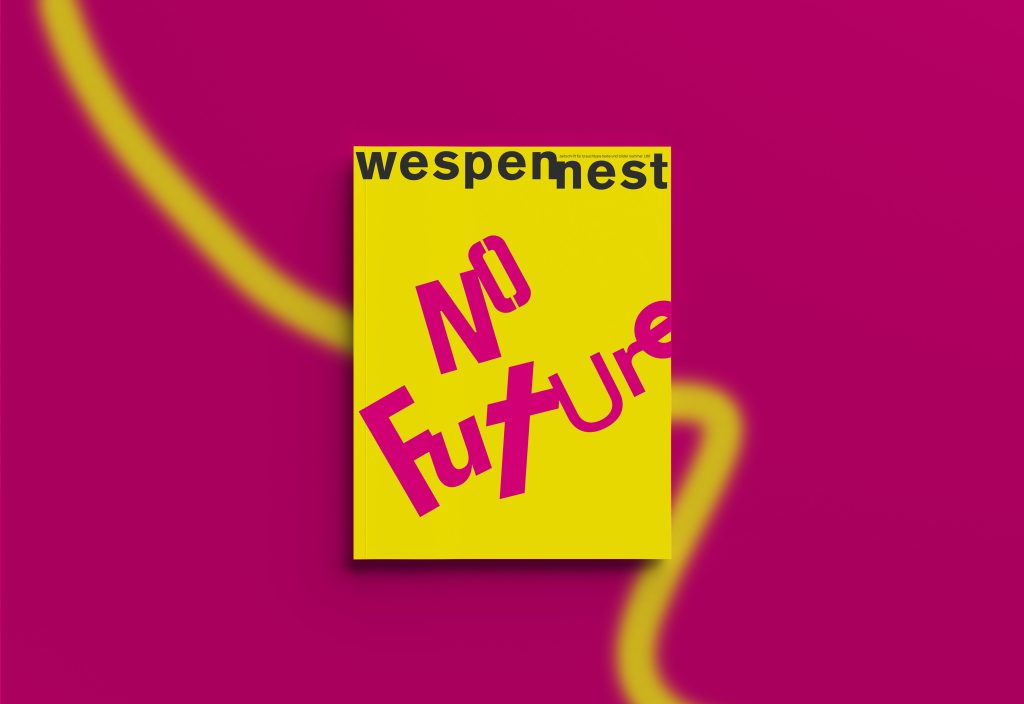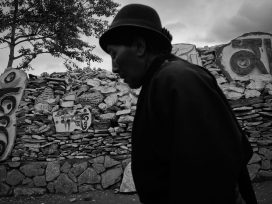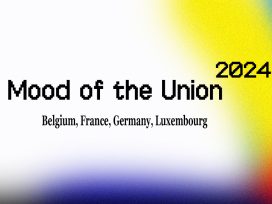Dreary, dismal, drab, forlorn. In an issue of Wespennest entitled ‘No future’ (a homage to the Sex Pistols, as the cover makes clear), Jens Balzer writes on ‘Softies, punks and smoked sausage: The pop-cultural marketization of apocalyptic feelings in the Eighties.’
With 1980s West Germany apparently threatened by nuclear apocalypse, the ‘softie’ band Die Bots provided the anthem for the huge anti-war demonstrations of the decade, with their song ‘Das Weiche Wasser’ (‘Soft Water): ‘Europe had two wars, the third will be the last … Just don’t give up: soft water breaks the stone.’ Nicole won the 1982 Eurovision Song Contest with ‘Ein bisschen Frieden’ (‘A little peace’) and Purple Schulz sung about ‘longing’ – his multiple fears and tears ‘unquestionably’ avant-garde, according to Balzer.
Punks generally agreed with environmentalists and peaceniks. But the Sex Pistols’ slogan ‘No Future’ permitted ‘free rein to their energies … especially the negative ones’ – or, as Blixa Bargeld of the West Berlin band, Einstürzende Neubauten, sung: ‘Say no, no, no, negative no, double no, three times no, just no’.

Punks had more fun than the equally nihilistic Last Generation of today, Balzer concludes, and unlike climate activists, made music and art. But they were ‘neither clearly “left” or “progressive”, as people romanticizing this youth movement suggest’.
Activist generations
Analyses of generational differences regarding ‘No future’ come from theatre director Elfe Brandenburger (b. 1958) and her daughters, Esther (b. 1998) and Merle (b. 1996). Their interview is entitled ‘Macht heil, was Ihr kaputt macht’ (‘Repair what you break’, a play on the 1968 slogan: Macht Kaputt, was Euch Kaputt macht – ‘Break what breaks you’).
Elfe Brandenburger protested NATO and atomic energy, and recalls the first organic-food and macrobiotic stores (because all supermarket food was supposedly be poisoned): ‘We really felt like our world was coming to an end … “No Future” wasn’t just a slogan.’ For Elfe’s youth, they aimed to ‘live fast and die young’ while also believing that indigenous peoples had the answers; now, she says, concerns are global. Daughter Esther says she hadn’t known the climate movement was so old, while Merle is disappointed to learn that ‘indigenous knowledge’ is no new promise.
Elfe recalls destroying things just to draw attention and gluing yuppies to windows. Today’s activists glue themselves to the streets. Her daughters volunteer for homeless women, seeking to balance not destroy the system, and feel empowered by ‘reformative reproductive actions’. They’re fearful and concerned, sensitive to the other side – including the police. ‘Binary thinking, viewing things as black and white is over,’ Elfe says. ‘Nothing’s that simple any longer.’ She and Merle agree that war, climate catastrophes and food shortages are the worst scenarios. Adaptation is the future.
Downhill from now on?
Tipping points are often evoked – with respect to the climate, migration and looming authoritarianism – and every generation thinks they’re there. But young people, too, are at a tipping point, writes psychoanalyst Wolf-Detlef Rost, noting young patients’ extreme fears. Doomsday visions could make us act in time, but would that unleash a state of emergency and increase social polarization?
According to psychoanalyst Delarum Habibi-Kohlen, just 25 per cent of the population can introduce fundamental changes and create a social tipping point. When alienated people remember to act by ‘separating the garbage, riding bicycles or not flying’, they can reconnect. ‘Without [such actions], there’s no long-term change. Because those who do not act individually lose the staying power needed to exert political pressure.’
When eternity begins
In ‘No future, forever and a day’, Stephan Steiner writes on how German composer Georg Philipp Telemann (1681–1767) abandoned his Baroque style to create ‘The Day of Judgement’ oratorio, featuring an atheist who mocks pious souls awaiting the Apocalypse in ‘probably the most gripping, moving and unforgettable aria of the whole piece. From then on, Christian inwardness is knee-deep in the Enlightenment… [T]he Day of Judgement is denied and dismissed.’
Steiner discusses the Christian ‘final future’ when time stands still and eternity begins. Early Church thinkers conceived of hell as extinction rather than torment, or saw universal reconciliation as the final state. ‘At one time, religious people could have conceived of a future perfect a last time. Then: nothing. Eternity. In any case, no future.’
Review by Nancy du Plessis







